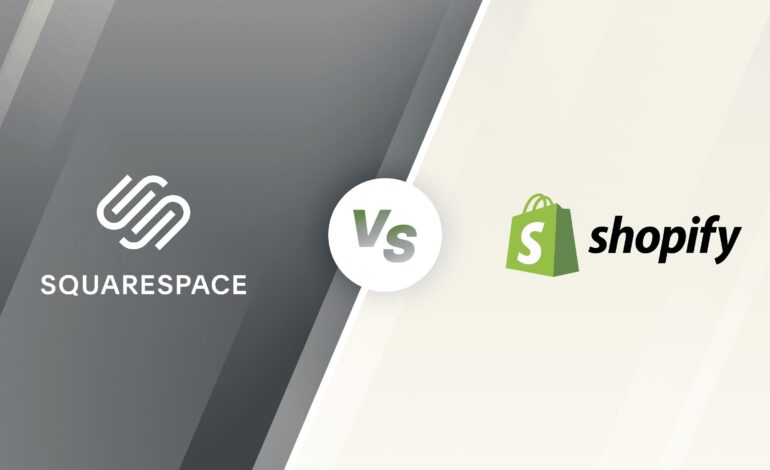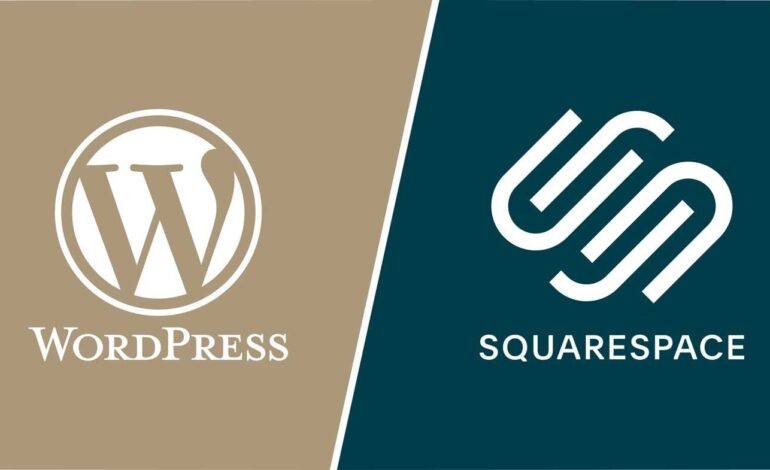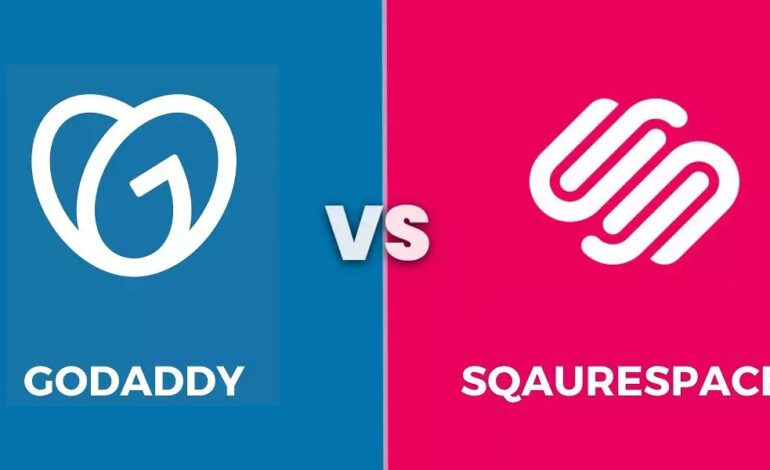
In today’s digital landscape, an e-commerce website is essential for businesses looking to expand their reach and increase sales. When it comes to choosing a platform to build your e-commerce site, two names stand out: Squarespace and Shopify. Both platforms offer powerful tools to help you create a professional online store, but they cater to different types of users and have distinct advantages and disadvantages. In this article, we’ll compare Squarespace and Shopify to help you decide which one is the best fit for your e-commerce business.

Overview of Squarespace and Shopify
Before diving into the details, let’s first look at what Squarespace and Shopify are and what they offer.
Squarespace is a website builder known for its user-friendly drag-and-drop interface and visually stunning templates. While Squarespace started primarily as a platform for building personal blogs and portfolios, it has since expanded to support e-commerce stores. Squarespace is known for its design-focused approach, making it ideal for businesses that prioritize aesthetics alongside functionality.
Shopify, on the other hand, is a platform that was specifically designed for e-commerce. It’s a comprehensive e-commerce solution, providing a range of tools tailored to online stores. Shopify is particularly popular with entrepreneurs and businesses of all sizes due to its focus on ease of use and powerful sales features. Shopify provides more advanced options for scalability, making it the preferred choice for larger businesses or those looking to grow rapidly.
Key Comparison: Squarespace vs Shopify
| Feature | Squarespace | Shopify |
|---|---|---|
| Ease of Use | Very user-friendly, drag-and-drop functionality Know more | User-friendly but can be more complex for beginners Know more |
| Pricing | Starts at $23/month for e-commerce plans Know more | Starts at $39/month for the Basic plan Know more |
| Design Flexibility | Offers visually appealing templates with customization Know more | Offers templates but with more limited design options Know more |
| E-commerce Features | Good for small businesses; basic e-commerce features Know more | Comprehensive e-commerce features with advanced tools Know more |
| Payment Options | Supports basic payment gateways like PayPal, Stripe Know more | Extensive payment gateway options, including Shopify Payments Know more |
| Scalability | Suitable for small to medium-sized businesses Know more | Great for all business sizes, especially larger stores Know more |
| SEO | Built-in SEO tools for basic optimization Know more | Advanced SEO features with apps and integrations Know more |
| Mobile Optimization | Mobile-friendly templates and responsive design Know more | Mobile-responsive with additional apps for optimization Know more |
| Customer Support | 24/7 support available via email and live chat Know more | 24/7 support with phone, email, and live chat options Know more |
| App Integrations | Limited third-party app integrations Know more | Extensive app marketplace with hundreds of integrations Know more |

Ease of Use
When it comes to ease of use, both Squarespace and Shopify are generally considered user-friendly. However, Squarespace stands out as one of the easiest website builders available, thanks to its drag-and-drop functionality. You don’t need any coding knowledge to create an e-commerce site on Squarespace. It’s perfect for those who want to build an aesthetically pleasing website without much technical hassle.
Shopify, while user-friendly, has a steeper learning curve compared to Squarespace. It offers more robust features, but this may overwhelm beginners who are new to e-commerce. However, for businesses with plans to scale or those who need more advanced features, Shopify’s complexity becomes a strength. Its interface is still intuitive, and the platform is designed to streamline the process of setting up and running an online store.
Pricing
Pricing is an important factor when choosing between the two platforms. Squarespace offers competitive pricing with plans starting at $23/month for e-commerce sites. This price includes essential e-commerce features such as a custom domain, product selling capabilities, and payment processing. For more advanced features like abandoned cart recovery and advanced analytics, the price goes up to $49/month.
Shopify starts at $39/month for the Basic Shopify plan, which is a bit higher than Squarespace’s entry-level pricing. However, Shopify’s pricing structure includes more advanced e-commerce features out of the box, such as professional reports, gift cards, and shipping integrations. Shopify’s pricing can scale significantly as you grow your business, with the Shopify Advanced plan priced at $299/month.
Pricing Breakdown:
| Plan | Squarespace | Shopify |
|---|---|---|
| Basic Plan | $23/month Know more | $39/month Know more |
| Advanced Plan | $49/month Know more | $79/month Know more |
| Enterprise Plan | Custom pricing Know more | $299/month and above Know more |
Design Flexibility
Squarespace is renowned for its sleek and modern templates, which are highly customizable. It’s an ideal platform for creative businesses such as photographers, designers, and artists who want their websites to make a visual impact. The templates are aesthetically pleasing and responsive, ensuring your site looks great on any device.
Shopify, in contrast, offers templates that are focused on functionality over form. While the designs are clean and professional, they may not have the same level of visual appeal that Squarespace provides. Shopify offers some customization options, but for more advanced design tweaks, users may need to delve into coding or install third-party apps.
E-Commerce Features
When it comes to e-commerce capabilities, Shopify shines with its feature set. As a platform built specifically for online stores, Shopify offers a wide range of tools that cater to businesses of all sizes. These include advanced inventory management, multi-channel selling (including social media and marketplaces like Amazon and eBay), and extensive shipping options. Shopify also integrates with a vast number of payment gateways and provides detailed sales analytics, allowing store owners to track performance and optimize their operations.
Squarespace, on the other hand, provides more basic e-commerce tools. It is suitable for smaller stores with fewer products and simpler needs. Squarespace offers essential features like inventory management, shipping integrations, and tax calculations, but it lacks the depth of options available on Shopify. If you plan to run a large-scale store or need advanced
features, Shopify would be the better option.
Scalability
Shopify is ideal for businesses looking to scale rapidly. It supports large product catalogs and has robust tools for handling a high volume of orders. If your business grows and requires more advanced features, Shopify can easily accommodate your needs with its higher-tier plans and numerous third-party app integrations.
In comparison, Squarespace is more suitable for small to medium-sized businesses. While it can handle growth to some extent, it may not be able to support a large product catalog or the advanced functionalities that businesses may need as they expand.
Both Squarespace and Shopify are excellent website builders for e-commerce, but they serve different types of users. If you’re looking for a simple, cost-effective, and design-focused platform, Squarespace is a solid choice. However, if you plan to scale your business, handle a large product catalog, or require advanced e-commerce features, Shopify is the better platform for you.
Whichever platform you choose, both provide everything you need to build a successful online store. Take your time to evaluate your business goals, budget, and desired features to make the best choice for your needs.



1 Comment
I’ve been using Squarespace for a while now, and I’m incredibly impressed! The templates are stunning and modern, making it easy to create a professional-looking website without any design experience. The platform is user-friendly, and the customer support team is always helpful and responsive. It’s perfect for anyone looking to build a website seamlessly